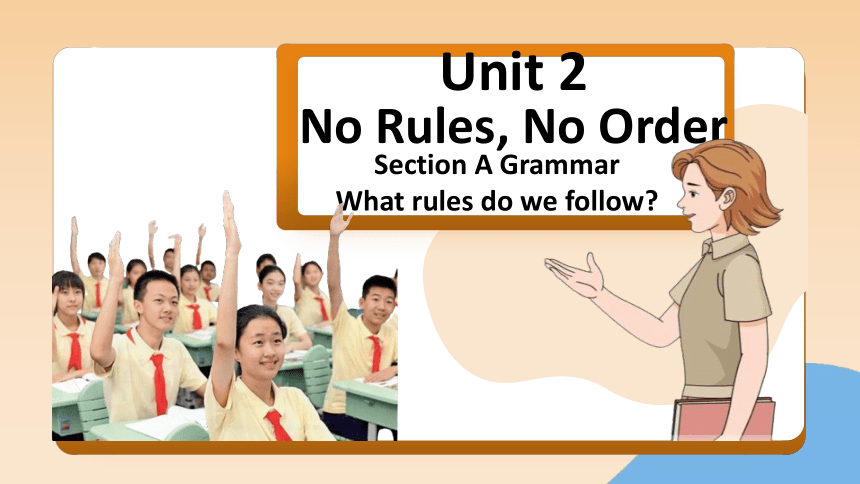(
课件网) Unit 2 No Rules, No Order Section A Grammar What rules do we follow Read and pay attention to the sentence patterns. Tom Ms Brown Tom, do you know the school rules now Yes, Ms Brown. I know many rules. For example, walk in the hallway. Any other rules Be polite and treat one another with respect. Don’t run. Don’t be rude. No smoking. Let’s follow the rules. Walk in the hallway. Be polite and treat one another with respect. Don’t run. Don’t be rude. No smoking. Let’s follow the rules. Read and find the rules. Why do we use imperatives(祈使句) To give commands(命令) To make requests(请求) To give warnings(警告) To give suggestions(建议) 肯定祈使句 否定祈使句 Let’s not break the rules. Do型祈使句 Be型祈使句 Let型祈使句 其它型祈使句 Do型祈使句 起床 吃你的早餐 把那个给我 读这本书 不要吃那个蛋糕 不要碰它 不要着急 不要坐这儿 Be型祈使句 小心 Let型祈使句 Don’t be careless. 不要粗心 让我们出去吧 我们别出去了。 How can we make imperatives more polite 其它型祈使句 No parking. No photos. No swimming. No feeding. Never give up. 由never开头构成的否定祈使句。 Tom and Anne are talking about the traffic rules. Anne, do you know some traffic rules Yes. You can turn right when you see the sign. You are right. Drivers can’t park here. You mean drivers mustn’t park here. Yes. We must look at both sides before crossing the road. I agree. We also have to wear a seatbelt while taking a car. Do you know the differences among can/have to/must Anne, do you know some traffic rules Yes. You can turn right when you see the sign. You are right. Drivers can’t park here. You mean drivers mustn’t park here. Yes. We must look at both sides before crossing the road. I agree. We also have to wear a seat belt while taking a car. can You can turn right when you see the sign. Can we bring our phones to class You can’t swim here. I can translate the rules into English. 表许可,意为“可以” 表请求,意为“可以” 表许可,意为“可以”(否定) 表能力,意为“能;会” must VS. have to Drivers mustn’t park here. We must look at both sides before crossing the road. Must强调说话者的主观意愿,“必须” 无人称和数的变化,后接动词原形。 We have to wear a seat belt while taking a car. She has to get up early to prepare breakfast. She doesn’t have to get up early to prepare breakfast. have to强调客观需要,“不得不” 有时态/人称/数的变化, 否定形式 don’t have to Pay attention! Must I do the dishes now Yes, you must. No, you needn’t. No, you don’t have to. Must开头的一般疑问句 肯定回答用must 否定回答用needn’t 或don’t have to. Pay attention! You must look after your sister tomorrow.(同义句) You have to look after your sister tomorrow.(同义句) 根据语境,must和have to可以转换同义句。 Summary Do型祈使句 Be型祈使句 Let型祈使句 其它型祈使句 can/can’t have to must/mustn’t Practice /kju / 插队 must have to can can’t must have to have to 旷课;缺席课程 must have to 系上你的安全带 must have to Practice Don’t park. No parkin ... ...

